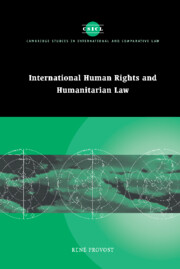Book contents
- Frontmatter
- Contents
- Acknowledgments
- Table of cases
- Table of treaties
- Table of other international instruments
- Introduction
- PART I Normative frameworks
- Introduction
- 1 Rights and procedural capacity
- 2 Obligations and responsibility
- Conclusion to Part I
- PART II Reciprocity
- PART III Application: law and facts
- General conclusion
- Bibliography
- Index
- CAMBRIDGE STUDIES IN INTERNATIONAL AND COMPARATIVE LAW
2 - Obligations and responsibility
Published online by Cambridge University Press: 07 September 2009
- Frontmatter
- Contents
- Acknowledgments
- Table of cases
- Table of treaties
- Table of other international instruments
- Introduction
- PART I Normative frameworks
- Introduction
- 1 Rights and procedural capacity
- 2 Obligations and responsibility
- Conclusion to Part I
- PART II Reciprocity
- PART III Application: law and facts
- General conclusion
- Bibliography
- Index
- CAMBRIDGE STUDIES IN INTERNATIONAL AND COMPARATIVE LAW
Summary
Obligations and responsibility of international actors other than states are not inextricably linked. They are related in a way similar to the relationship between rights and procedural capacity noted at the beginning of chapter 1. The fact that an obligation is imposed on individuals does not necessarily lead to the conclusion that they will be held personally accountable for its breach. Conversely, the fact that someone can be ascribed responsibility for the violation of a norm of international law does not necessarily evidence the existence of an obligation imposed on that person. Delictual capacity and responsibility are related but not necessarily attached. An illustration can be found in crimes against peace. The prohibition of the use of force in international relations can be breached only by states but, as demonstrated by the convictions handed down by the International Military Tribunal at Nuremberg and by Article 5 of the ICC Statute, the penal responsibility is borne by the individuals with control over the conduct of the state.
The dissociation of obligation and sanction might be seen as problematic, because of the apparent unfairness of someone being held responsible for the breach of another. There was no such difficulty with respect to rights, where a similar dissociation resulted only in the imposition of restrictions on the exercise of the rights. The justification lies at the levels of both practice and theory.
- Type
- Chapter
- Information
- International Human Rights and Humanitarian Law , pp. 57 - 115Publisher: Cambridge University PressPrint publication year: 2002

